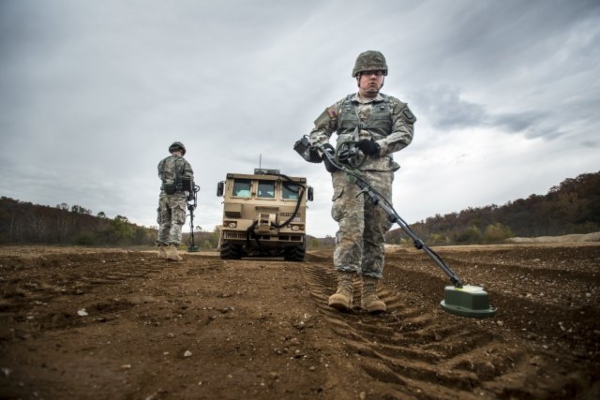Combat Engineers (MOS 12B) are important to the daily operations of the U.S. Army.
An Army Combat Engineer serves, assists, or supervises a team while dealing with rough terrain and generally in combat situations.
MOS 12B Army Engineers are experts in mobility, counter-mobility, engineering, and survival.
It would be nearly impossible for the U.S. Army to function properly without the assistance of MOS 12B.
Related Article – Army MOS List: A List Of All 159 Army Jobs
Jump To A Section
Education, Qualifications, Training, and Duty Stations
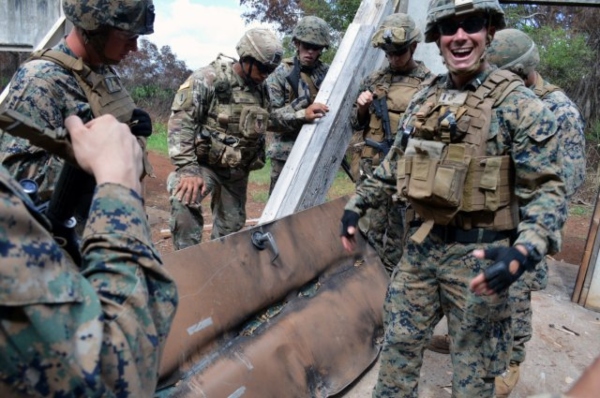
Army Combat Engineers are part fighters, part builders of defense and transport systems.
The purpose is to create an easier method for your fellow soldiers to engage the enemy while also becoming a destroyer of enemy defense positions and obstacles.
As a result, there are several important qualifications and training you need to become MOS 12B.
Related Article – US Air Force Engineering (3E5X1): Career Details
Education
You are allowed to pick your military occupation specialty (MOS) in the Army as long as you qualify and there is an opening.
Field 12 is the overarching category for Army engineers.
MOS 12B is a blend of combat fighter and engineer.
If you are interested in becoming MOS 12B, you need to get a score of 87 or higher on the CO portion of the Armed Services Vocational Aptitude Battery (ASVAB).
The CO score is a combination of Word Knowledge, Paragraph Comprehension, Auto & Shop Skills, and Mechanical Comprehension.
Qualifications
Though it is not mandatory, it is a good idea to already know how to use a variety of hand and power tools.
Combat Engineers spend a lot of time performing under strenuous conditions, sometimes over prolonged periods of time.
It helps to have a combination of an engineering type of mind, as well as a love for action and working outdoors.
Related Article – Army APFT Test Standards For Males and Females
Training
Once you pass the ASVAB, it is time for basic training.
Combat Engineers must complete the standard 14 weeks of One Station Unit Training (OSUT) which is a combination of Basic Combat Training (BCT) and Advanced Individual Training (AIT).
Army Engineers have the choice between specializing in combat engineering (12B), general engineering, or geospatial engineer operations.
Training is a combination of classroom lessons and practical work out in the field.
MOS 12B receive their engineering training at Fort Leonard Wood in Missouri.
Skills you will acquire include an understanding of basic demolition, basic explosive hazards, basic urban operations, fixing bridges, constructing wire obstacles, and operating heavy equipment.
Duty Stations
Those serving in the Army in MOS 12B can expect to be potentially based at one of the following duty stations:
Inside the Continental US (CONUS)
- Fort Belvoir, VA
- Fort Bliss, TX
- Fort Campbell, KY
- Fort Carson, CO
- Fort Cavazos, TX
- Fort Drum, NY
- Fort Irwin, CA
- Fort Johnson, LA
- Fort Knox, KY
- Fort Leonard Wood, MO
- Fort Liberty, NC
- Fort Moore, GA
- Fort Riley, KS
- Fort Stewart, GA
- Joint Base Lewis-McChord, WA
Outside the Continental US (OCONUS)
- Fort Wainwright, AK
- USAG Bavaria, Germany
- USAG Hawaii
- USAG Italy, Vicenza
What does an Army Combat Engineer Do?
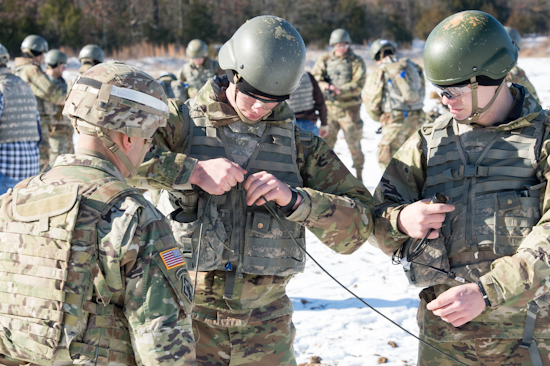
Related Article – List of Army Bases in the US
The Army Combat Engineer (MOS 12B) is part of a larger squad and is assigned specific duties.
Combat engineers are experts on certain functions of the U.S. Army.
They are excellent at building infrastructure, understanding prime firing positions, detecting mines, building or detonating explosives, and handling rough terrain.
They are more or less modern-day Army “MacGyvers.”
Engineering
MOS 12B are first and foremost engineers.
Consequently, Army Combat Engineers are outstanding at constructing just about everything from places of military engagement to building structures to creating defense mechanisms.
MOS 12B are the very definition of an engineer which is “the branch of science and technology concerned with the design, building, and use of engines, machines, and structures.”
You can expect to design and build everything from infrastructure to explosives.
Explosives
Combat Engineers (MOS 12B) are experts with explosives of all types.
They are able to not only successfully build them from scratch, but also have an understanding of where to tactically place them in the field.
As a result, MOS 12B are tasked in a larger squad with handling and supervising the placement of explosives.
Engineers are experts in a variety of combat situations and know the right defensive systems to install based on the location and demands of the mission.
Related Article – Navy Explosive Ordnance Disposal (EOD) Technician: Career Details
Terrain
One overlooked aspect of the job duties of Army Combat Engineers is the ability to deal with terrain.
Combat Engineers are experts in managing difficult obstacles and climates.
They are able to conduct operations that clear routes for the rest of the squad.
These include troubling places to cross like rivers where the ability to construct a quick bridge is mandatory to the success of an operation.
Sometimes obstacles must also be cleared in order to make way with the use of explosives or other machinery.
MOS 12B are heavy equipment operators that know how to handle a variety of machinery.
Safety
Another important thing to note about MOS 12B is their immense responsibility toward keeping the rest of the squad safe.
As a result, Combat Engineers are tasked with detecting mines – either visually or with mine detectors.
It is the reason why MOS 12B are sometimes nicknamed for being individuals that “Clear the Way” in combat.
The importance of Army Sappers, or MOS 12B, has only increased with the recent conflicts in Iraq and Afghanistan where bomb clearing is essential.
Related Article – Army Horizontal Construction Engineer (MOS 12N): Career Details
Secondary Infantry
Though Army Combat Engineers (12B) are most well known for engineering, they also have combat skills.
MOS 12B can support front-line infantry when necessary.
Combat Engineers are trained soldiers that have the ability to operate firearms though they primarily specialize in explosives.
A Soldier must be a Graduate of the Sapper Leader Course, a 28-day course designed to train leaders in small unit tactics, leadership skills, and skills required to perform as part of a combined arms team, to become a Sapper and wear the Sapper Tab.
What does an Army Combat Engineer make?
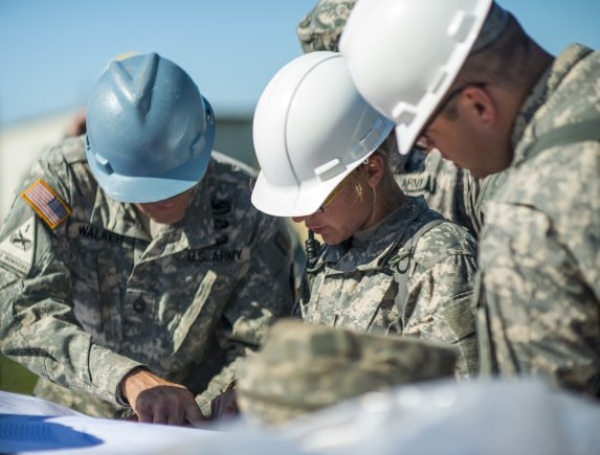
Army personnel are paid the same regardless of their job.
The amount of pay depends on your rank as well as your years of service (see table, below).
Combat Engineers (MOS 12B) begin with a base salary of around $23,000 for E-1 Army Privates.
| Insignia | Pay Grade | Rank | Abbreviation | Minimum Monthly Pay |
|---|---|---|---|---|
| E-1 +4 months | Private | PVT | $1,917.60 | |
| E-2 | Private Second Class | PV2 | $2,149.20 | |
| E-3 | Private First Class | PFC | $2,259.90 | |
| E-4 | Specialist | SPC | $2,503.50 | |
| E-4 | Corporal | CPL | $2,503.50 | |
| E-5 | Sergeant | SGT | $2,730.30 | |
| E-6 | Staff Sergeant | SSG | $2,980.50 | |
| E-7 | Sergeant First Class | SFC | $3,445.80 | |
| E-8 | Master Sergeant | MSG | $4,957.20 | |
| E-8 | First Sergeant | 1SG | $4,957.20 | |
| E-9 | Sergeant Major | SGM | $6,055.50 | |
| E-9 | Command Sergeant Major | CSM | $6,055.50 | |
| E-9 | Sergeant Major of the Army | SMA | $6,055.50 |
Benefits
Though the pay is not outstanding, especially for E-1, there are several other benefits provided by the U.S. Army:
- Medical Insurance
- Vacation Time
- Retirement
- Special Pay
- Housing: Allowances for living expenses, utilities, and maintenance.
- Food: Allowance for the on-base dining hall and access to tax-free department and grocery stores.
- Education: Army members can earn full tuition, merit-based scholarships, allowances for books and fees, plus an annual stipend for living expenses.
Related Article – US Army Grooming Standards
Job Reviews
The general consensus is that working as an MOS 12B is one of the more fulfilling careers in the Army.
Here are a few Army Combat Engineer job reviews we’ve come across:
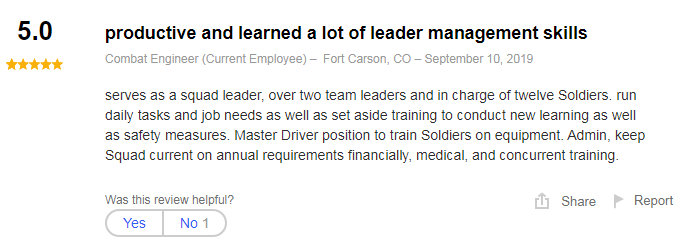

Engineers are in high demand both in the U.S. Army and after military service with civilian jobs (see more, below).
MOS 12B combines the ability to use your brain to design and build infrastructure, as well as the thrill and adrenaline of live combat.
However, Combat Engineers can expect to be deployed to dangerous locations such as Afghanistan and the Middle East where bomb clearing is vital to the success of military operations.
Related Article – Army Bridge Crewman (MOS 12C)
Civilian Job Opportunities
Since MOS 12B are engineers, they can attain civilian engineering jobs after leaving the U.S. Military.
Employers also appreciate that Combat Engineers have worked under extremely high-pressure situations and are often natural leaders.
The construction industry, along with inspection jobs, are the two most relevant hires.
Summary
The role of the Army Combat Engineer (MOS 12B) is becoming increasingly important with the recent conflicts in Afghanistan and Iraq.
Combat Engineers are capable of a variety of tasks that help a large squad survive in combat.
Additionally, the civilian job outlook post-retirement from the U.S. Military is very bright.
Resources:
- https://www.goarmy.com/careers-and-jobs/browse-career-and-job-categories/construction-engineering/combat-engineer.html
- https://www.cool.osd.mil/army/enlisted/12b.htm
- https://www.army.mil/article/200797/combat_engineers_enable_infantry_commanders_soldiers
- 68 Series MOS: A List of Medical Field Jobs in the Army - June 19, 2024
- 15 Series MOS: US Army Aviation Jobs - June 19, 2024
- 11 General Orders For Each Military Branch - June 19, 2024
Originally posted on September 17, 2019 @ 7:04 pm
Affiliate Disclosure: This post may contain affiliate links. If you click and purchase, I may receive a small commission at no extra cost to you. I only recommend products I have personally vetted. Learn more.
